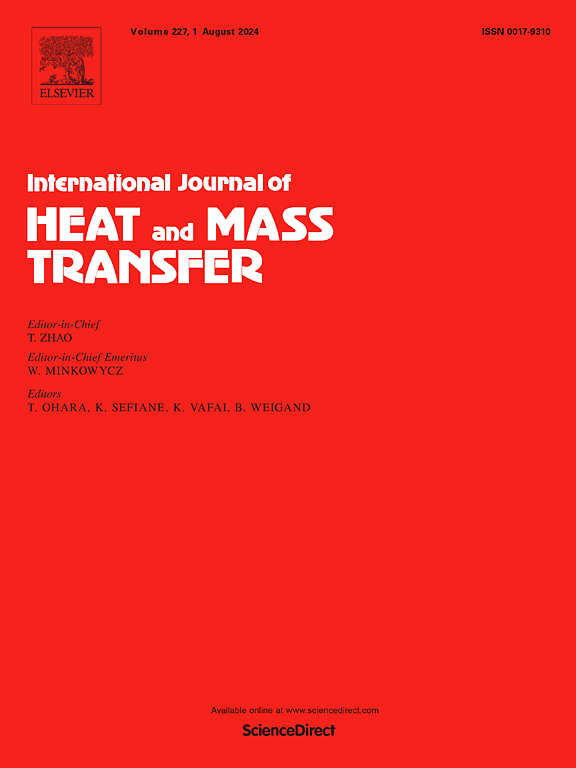An inverse methodology to estimate the orthotropic thermal conductivities of AMP20M1HD-A pouch-type Li-ion battery
IF 5.8
2区 工程技术
Q1 ENGINEERING, MECHANICAL
International Journal of Heat and Mass Transfer
Pub Date : 2025-02-22
DOI:10.1016/j.ijheatmasstransfer.2025.126804
引用次数: 0
Abstract
Electric vehicles (EVs) have emerged as a promising solution for addressing some of the crucial sustainable development goals like affordable and clean energy. However, they are susceptible to battery thermal runaway raising serious safety concerns. To mitigate these concerns, it is imperative to design an effective battery thermal management system (BTMS). A knowledge of the thermophysical properties of the battery is a prerequisite for designing an effective BTMS. It is challenging to measure these properties as the batteries exhibit anisotropic behavior. The current work employs the powerful Metropolis Hastings–Markov Chain Monte Carlo (MH-MCMC) coupled Bayesian-inference-based inverse methodology driven by an artificial neural network (ANN) to estimate the orthotropic thermal conductivities (kxx, kyy, and kzz) of an actual AMP20M1HD-A pouch-type Li-ion battery using experimentally measured surface temperatures at suitable locations for five different heat inputs. The obtained average mean estimates (kxx = (20.14 ± 1.44) W/mK, kyy = (2.90 ± 0.2) W/mK, and kzz = (21.47 ± 1.39) W/mK) were found to be in close agreement with the values reported in the literature. The impact of temperature on kxx, kyy, and kzz was studied, and the results show that the properties are temperature-independent. Based on the sensitivity analysis conducted, the most and the least sensitive thermocouples in the estimation of kxx, kyy, and kzz were identified. The outcomes of the current work show the superiority of the proposed inverse methodology in the thermal characterization of live batteries using minimal temperature measurements and temperature measuring devices having varied levels of uncertainty.
一种估算AMP20M1HD-A袋式锂离子电池正交各向异性热导率的反演方法
电动汽车(ev)已经成为解决一些关键可持续发展目标(如负担得起的清洁能源)的有希望的解决方案。然而,它们容易受到电池热失控的影响,引发了严重的安全问题。为了减轻这些担忧,设计一个有效的电池热管理系统(BTMS)势在必行。了解电池的热物理特性是设计有效的BTMS的先决条件。由于电池表现出各向异性行为,测量这些特性是具有挑战性的。目前的工作采用强大的Metropolis Hastings-Markov Chain Monte Carlo (MH-MCMC)耦合基于贝叶斯推理的逆方法,由人工神经网络(ANN)驱动,利用实验测量的五种不同热输入位置的实际AMP20M1HD-A袋式锂离子电池的表面温度来估计其正交异性热导率(kxx, kyy和kzz)。得到的平均估计值(kxx =(20.14±1.44)W/mK, kyy =(2.90±0.2)W/mK, kzz =(21.47±1.39)W/mK)与文献报道的值非常吻合。研究了温度对kxx、kyy和kzz的影响,结果表明,这些性质与温度无关。通过灵敏度分析,确定了kxx、kyy和kzz估计中最敏感和最不敏感的热电偶。当前工作的结果显示了所提出的逆方法在使用最小温度测量和具有不同不确定度的温度测量设备的活电池热表征方面的优越性。
本文章由计算机程序翻译,如有差异,请以英文原文为准。
求助全文
约1分钟内获得全文
求助全文
来源期刊
CiteScore
10.30
自引率
13.50%
发文量
1319
审稿时长
41 days
期刊介绍:
International Journal of Heat and Mass Transfer is the vehicle for the exchange of basic ideas in heat and mass transfer between research workers and engineers throughout the world. It focuses on both analytical and experimental research, with an emphasis on contributions which increase the basic understanding of transfer processes and their application to engineering problems.
Topics include:
-New methods of measuring and/or correlating transport-property data
-Energy engineering
-Environmental applications of heat and/or mass transfer

 求助内容:
求助内容: 应助结果提醒方式:
应助结果提醒方式:


